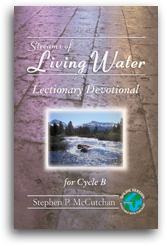SermonStudio
Proper 16
Devotional
Streams of Living Water
Lectionary Devotional for Cycle B
1 Kings 8:(1, 6, 10-11) 22-30, 41-43
But will God indeed dwell on the earth? Even the heaven and the highest heaven cannot contain you, much less this house that I have built!
-- 1 Kings 8:27
But will God indeed dwell on the earth? Even the heaven and the highest heaven cannot contain you, much less this house that I have built!
-- 1 Kings 8:27


